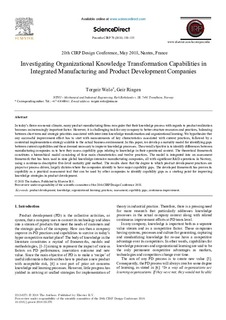| dc.contributor.author | Welo, Torgeir | |
| dc.contributor.author | Ringen, Geir | |
| dc.date.accessioned | 2018-12-19T08:51:02Z | |
| dc.date.available | 2018-12-19T08:51:02Z | |
| dc.date.created | 2018-09-27T10:40:30Z | |
| dc.date.issued | 2018 | |
| dc.identifier.citation | Procedia CIRP. 2018, 70 150-155. | nb_NO |
| dc.identifier.issn | 2212-8271 | |
| dc.identifier.uri | http://hdl.handle.net/11250/2578244 | |
| dc.description.abstract | In today’s fierce economic climate, many product manufacturing firms recognize that their knowledge process with regards to product realization becomes an increasingly important factor. However, it is challenging task for any company to better structure resources and practices, balancing between short term and strategic priorities associated with inter-intra knowledge transformation and organizational learning. We hypothesize that any successful improvement effort has to start with measurements of key characteristics associated with current practices, followed by a contextual implementation strategy scalable to the actual business environment. In this paper, we develop a maturity model for identifying gaps between current capabilities and those deemed necessary to improve knowledge processes. The overall objective is to identify differences between manufacturing companies as to how they assess capability gaps relating to knowledge in their operational context. The theoretical framework constitutes a hierarchical model consisting of four main characteristics and twelve practices. The model is integrated into an assessment framework that has been used in nine global knowledge-intensive manufacturing companies, all with significant R&D operations in Norway, using a continuous descriptive five-level maturity grid method. The results show that the degree to which product development practices are project or process driven, largely dictates where the companies identify to have major capability gaps. The developed framework has proven its capability as a practical assessment tool that can be used by other companies to identify capability gaps as a starting point for improving knowledge strategies in product development. | nb_NO |
| dc.language.iso | eng | nb_NO |
| dc.publisher | Elsevier | nb_NO |
| dc.rights | Attribution-NonCommercial-NoDerivatives 4.0 Internasjonal | * |
| dc.rights.uri | http://creativecommons.org/licenses/by-nc-nd/4.0/deed.no | * |
| dc.title | Investigating Organizational Knowledge Transformation Capabilities in Integrated Manufacturing and Product Development Companies | nb_NO |
| dc.type | Journal article | nb_NO |
| dc.type | Peer reviewed | nb_NO |
| dc.description.version | publishedVersion | nb_NO |
| dc.source.pagenumber | 150-155 | nb_NO |
| dc.source.volume | 70 | nb_NO |
| dc.source.journal | Procedia CIRP | nb_NO |
| dc.identifier.doi | 10.1016/j.procir.2018.03.276 | |
| dc.identifier.cristin | 1614562 | |
| dc.description.localcode | © 2018 The Author(s). Published by Elsevier B.V. CC-BY-NC-ND 4.0 license http://creativecommons.org/licenses/by-nc-nd/4.0/ | nb_NO |
| cristin.unitcode | 194,64,92,0 | |
| cristin.unitname | Institutt for maskinteknikk og produksjon | |
| cristin.ispublished | true | |
| cristin.fulltext | original | |
| cristin.qualitycode | 1 | |

